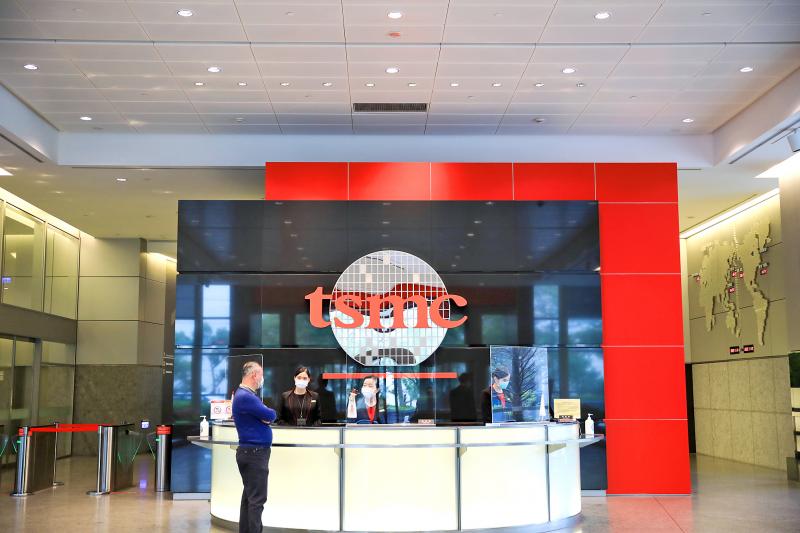Taiwan Semiconductor Manufacturing Co (TSMC, 台積電) yesterday said that Japan-based Denso Corp will take a minority stake in its Japanese venture with Sony Semiconductor Solution Corp, a partnership that is to build a plant in Japan amid a scarcity of chips for automobiles.
With an investment of US$350 million, Denso would hold a more than 10 percent stake in Japan Advanced Semiconductor Manufacturing Inc (JASM) in Kumamoto Prefecture, TSMC said in a statement.
“Semiconductors are becoming increasingly important in the automotive industry as mobility technologies evolve, including automated driving and electrification,” Denso chief executive officer Koji Arima said in the statement. “Through this partnership, we contribute to the stable supply of semiconductors over the medium to long term and thus to the automotive industry.”

Photographer: I-Hwa Cheng/Bloomberg
Construction of the new fab is to begin this year, with production to begin by the end of 2024, TSMC said.
TSMC plans to enhance JASM’s capabilities with 12-nanometer and 16-nanometer process technologies in addition to the previously announced 22-nanometer and 28-nanometer technologies, it said.
The new facility would increase monthly capacity to 55,000 12-inch wafers, it said.
Capital expenditure for the new fab is estimated to be US$8.6 billion, TSMC said, adding that it would create about 1,700 jobs.
TSMC also said it is recruiting a business intelligence analyst to help collect data regarding political economics for internal analysis.
It is the first time that the firm has recruited for such a position as geopolitical issues become more important for multinational enterprises.
TSMC three years ago hired Peter Cleveland to enhance its communications with government agencies in the US.
Cleveland is a vice president of TSMC who directs global policy.
Its board of directors yesterday approved the distribution of a NT$2.75 per share cash dividend for last quarter.
The board approved distribution of performance bonuses and profit sharing totaling NT$71.2029 billion (US$2.55 billion) for last year and approved capital appropriations of US$20.94 billion.
To finance TSMC’s capacity expansion and pollution prevention related expenditure, the board approved the issuance in Taiwan of up to NT$60 billion of unsecured corporate bonds and up to US$1 billion of US dollar-denominated unsecured corporate bonds.
The board approved the issuance of 1.387 million shares as restricted stock awards for employees to attract and retain executives and talent, and to link compensation with shareholders’ interests and environmental, social and corporate governance achievements.
To offset dilution from the increase in shares due to the issuance, the board approved a program for the company to buy back its common shares on the Taiwan Stock Exchange.
The board approved the issuance of no more than 2.96 million common shares for restricted stock awards, with the plan to be presented to shareholders at the annual meeting on June 8 for approval.

Intel Corp chief executive officer Lip-Bu Tan (陳立武) is expected to meet with Taiwanese suppliers next month in conjunction with the opening of the Computex Taipei trade show, supply chain sources said on Monday. The visit, the first for Tan to Taiwan since assuming his new post last month, would be aimed at enhancing Intel’s ties with suppliers in Taiwan as he attempts to help turn around the struggling US chipmaker, the sources said. Tan is to hold a banquet to celebrate Intel’s 40-year presence in Taiwan before Computex opens on May 20 and invite dozens of Taiwanese suppliers to exchange views

Application-specific integrated circuit designer Faraday Technology Corp (智原) yesterday said that although revenue this quarter would decline 30 percent from last quarter, it retained its full-year forecast of revenue growth of 100 percent. The company attributed the quarterly drop to a slowdown in customers’ production of chips using Faraday’s advanced packaging technology. The company is still confident about its revenue growth this year, given its strong “design-win” — or the projects it won to help customers design their chips, Faraday president Steve Wang (王國雍) told an online earnings conference. “The design-win this year is better than we expected. We believe we will win

Chizuko Kimura has become the first female sushi chef in the world to win a Michelin star, fulfilling a promise she made to her dying husband to continue his legacy. The 54-year-old Japanese chef regained the Michelin star her late husband, Shunei Kimura, won three years ago for their Sushi Shunei restaurant in Paris. For Shunei Kimura, the star was a dream come true. However, the joy was short-lived. He died from cancer just three months later in June 2022. He was 65. The following year, the restaurant in the heart of Montmartre lost its star rating. Chizuko Kimura insisted that the new star is still down

While China’s leaders use their economic and political might to fight US President Donald Trump’s trade war “to the end,” its army of social media soldiers are embarking on a more humorous campaign online. Trump’s tariff blitz has seen Washington and Beijing impose eye-watering duties on imports from the other, fanning a standoff between the economic superpowers that has sparked global recession fears and sent markets into a tailspin. Trump says his policy is a response to years of being “ripped off” by other countries and aims to bring manufacturing to the US, forcing companies to employ US workers. However, China’s online warriors